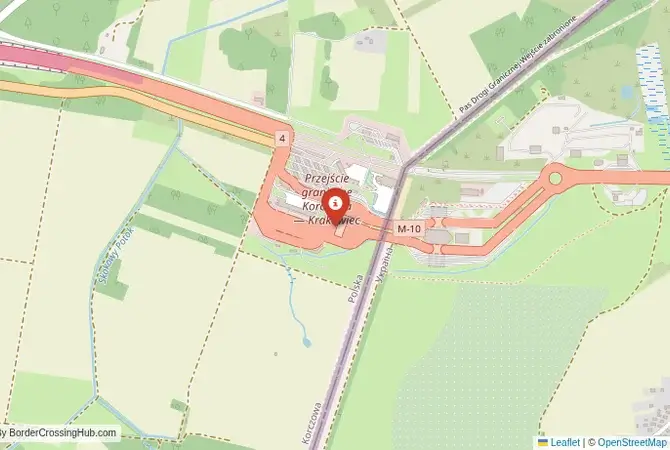
Approximate Border Location
Wait Times
30–120 min frequent
Just crossed? Tap to report:
Operating Hours
24 hours
Crossing Types
Pedestrians, vehicles, freight
Border Type
Land crossing via road
Peak Times
7–10 AM, weekends
Daily Crossings
12,000–18,000 daily
Currency Exchange
Banks nearby; UAH, PLN
Safety Information
High volume; organized
Languages Spoken
Ukrainian/Polish
Accessibility Features
Ramps, elevators
About Korczowa & Krakivets
Monthly Update (February 2026):
The Korczowa & Krakivets Border Crossing sees steady movement broken by long pauses, especially for freight. February 2026 has brought a mostly stable pattern, with Poland-bound traffic slowing first. Truck inspections take longer than car checks. Weather and weekday freight surges are the main variables.
The Main Lviv-Krakow Motorway Crossing
Important Note for Travelers: Due to the ongoing war in Ukraine, this border crossing is a critical lifeline and experiences extremely long and unpredictable wait times, particularly for freight. It has also been the site of protests and blockades. It is absolutely essential to consult official government sources and live queue data for the most up-to-date information on its operational status before planning any travel. As of early 2026, wait times remain highly variable with occasional blockades and restrictions due to ongoing protests and security measures. The border crossing connecting Krakivets in Ukraine with Korczowa in Poland is the southern counterpart to the Yahodyn-Dorohusk crossing. This is the main motorway checkpoint, where Ukraine’s M10 highway meets Poland’s A4 motorway, forming the primary high-speed corridor between the major cities of Lviv and Krakow, and by extension, Western Europe. This is a massive, 24/7 international facility, a landscape of vast parking lots, long canopies, and endless lines of trucks and cars. It is a critical artery for Ukraine’s economy and a primary gateway for travelers, a place defined by its immense scale and its vital strategic importance.
Operational Details
This checkpoint connects Ukraine’s Lviv Oblast with Poland’s Podkarpackie Voivodeship. It is a full-service international crossing, open to all passenger cars, buses, and commercial freight. It is one of the largest and most modern checkpoints on the EU’s eastern border, specifically designed to handle the high volume of traffic on the A4 motorway, which is a major trans-European route. Since the 2022 invasion, its role has become even more critical, handling a huge volume of humanitarian aid, military supplies, and commercial goods. This has placed an unprecedented strain on its infrastructure, leading to severe and persistent congestion.
A History of a Modern Corridor
The history of this crossing as a major hub is relatively recent. While the route between Lviv and Krakow is ancient, the development of a modern motorway and a large-scale border facility is a product of the post-Soviet era and Poland’s integration into the European Union. The crossing was extensively modernized and expanded, particularly in preparation for the UEFA Euro 2012 football championship, which was co-hosted by Poland and Ukraine. It was designed to be a flagship of modern border management, a symbol of the growing partnership between the two countries. Today, it stands as a symbol of Ukraine’s lifeline to the West.
Border Crossing Procedure
The border crossing procedure is a rigorous and often extremely slow process, reflecting its status as a primary entry point into the EU and the Schengen Area. You will first complete exit formalities at the large Ukrainian checkpoint at Krakivets. After this, you will proceed to the even larger Polish checkpoint at Korczowa for a full EU entry inspection by the Polish Border Guard (Straż Graniczna) and Customs Service. You will need a valid passport, vehicle registration, and international insurance (Green Card). Customs inspections are thorough. The combination of massive traffic volume, meticulous security checks, and potential disruptions from protests or blockades makes this one of the most challenging crossings in terms of wait times.
The Surrounding Region
The surrounding area is a landscape of rolling hills and fields. On the Ukrainian side, Krakivets is a small border town. The crossing is the main gateway to the magnificent city of Lviv, a UNESCO World Heritage site and the cultural capital of western Ukraine. On the Polish side, Korczowa is a village dominated by the border complex and its associated logistics centers. The A4 motorway provides a direct, high-speed connection to the historic cities of Rzeszów and Krakow, and onwards to Germany. The region is part of the historic land of Galicia.
Essential Practical Planning
Practical planning is absolutely critical for this route. You must be prepared for extreme wait times. Have a full tank of fuel, and ample food, water, and any necessary medications. The official currencies are the Ukrainian Hryvnia (UAH) and the Polish Złoty (PLN). Large service stations and other facilities are available on the motorway on both sides, but may be inaccessible if you are stuck in a queue. You will need the Polish `e-TOLL` system if you are driving a vehicle over 3.5 tonnes. Always check the latest official information on queue lengths, potential blockades, and any new travel restrictions before heading to the border. A flexible travel schedule is not just an advantage; it is a necessity.
Final Considerations
The Krakivets–Korczowa border crossing is the southern pillar of the Ukraine-Poland connection. It is a place of immense logistical importance, operating under unimaginable pressure. For travelers, it can be a daunting and exhausting experience, but it is also a direct encounter with the resilience of a nation at war and the solidarity of its neighbors. It is a border that is more than a line on a map; it is a critical artery for survival and a symbol of Ukraine’s unbreakable link to Europe.
No reviews yet.
